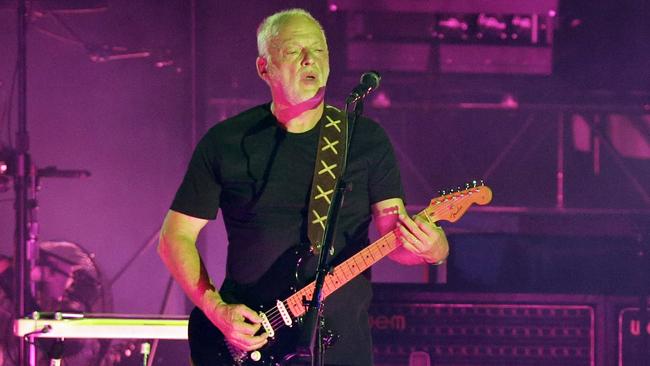Pink Floyd’s Gilmour auctions guitars for green cause
David Gilmour set an auction record when one of his guitars fetched almost $US4m at Christie’s in New York.

Nearly 50 years since David Gilmour sang the word “Money” to the sound of ringing cash registers on Pink Floyd’s song of the same name, he has raised a record-breaking $US21.5 million ($31m) by selling his most precious guitars.
The sale also achieved an auction record for an individual guitar when a bidder paid $US3,975,000, including buyer’s premium, for Gilmour’s 1969 black Fender Stratocaster, which rings out on albums including The Wall, Wish You Were Here and Dark Side of the Moon.
The lot was sold at Christie’s, New York, which had to delay the start of the auction to accommodate bidders who had queued around the block.
It beat the previous record, set in 2004, when Eric Clapton sold Blackie, the Fender Stratocaster he credited with helping him to fight his drug and alcohol addictions. Blackie fetched $US959,500 at a sale at the same auction house.
Gilmour, 73, who sold more than 120 instruments to raise money for the climate change charity Client Earth, also sold the 1954 white Stratocaster he used on Another Brick in the Wall (Parts 1 and 2) for $US1,815,000 and a 1955 Gibson Les Paul, used on Parts 2 and 3, for $US447,000. The musician retained some guitars to which he felt too attached. Julian Stockton, his publicist, said there were two that he would continue to play.
One is a 1955 Fender Esquire which is affectionately known as “The Workmate”, which he used on Pink Floyd albums such as The Wall. The other is a Gretsch black Duo Jet guitar from the 1950s, which he used most recently on his album Rattle That Lock in 2015.
Gilmour said that he felt strongly about the work of Client Earth, which “uses the power of the law to protect the planet”.
He added: “I hope that the sale of these guitars will help Client Earth in their cause to use the law to bring about real change.
“We need a civilised world that goes on for all our grandchildren and beyond in which these guitars can be played and songs can be sung.”
The Times


